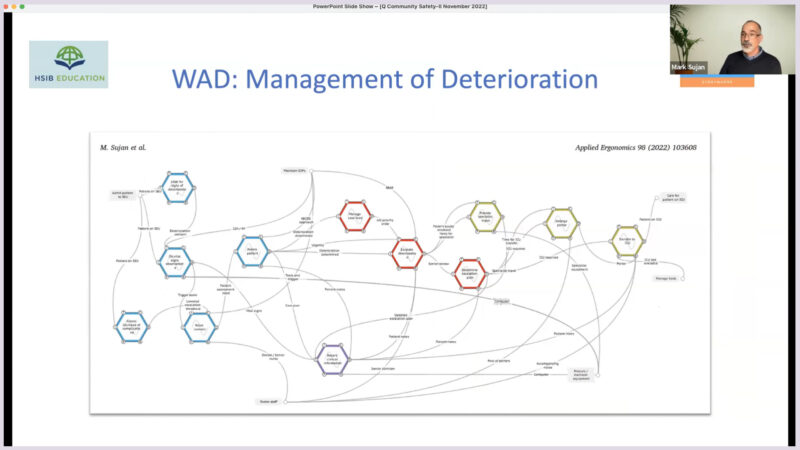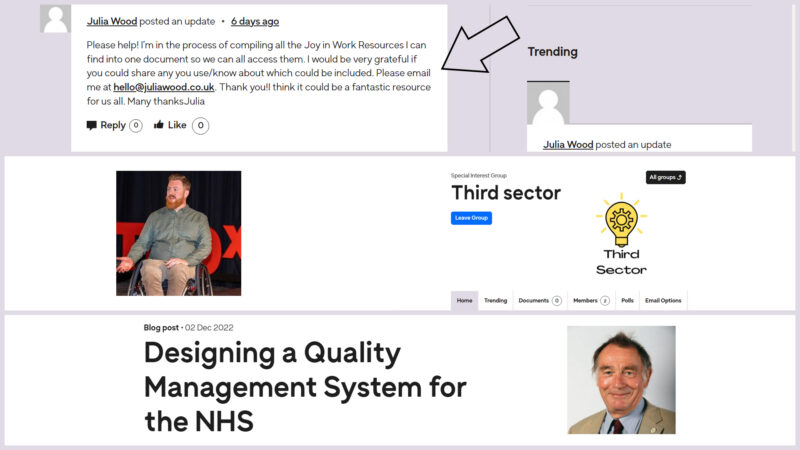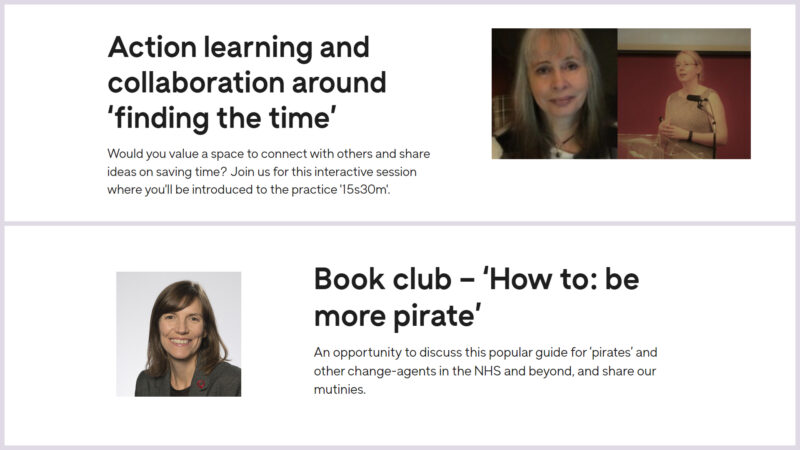The BMJ Quality & Safety co-author of The problem with making Safety-II work in healthcare Mark Sujan took part in one of the most interesting conversations that our Groups (aka Special Interest Groups, SIGs) had in December.

Mark began by explaining how the new Safety-II shifts the emphasis away from solely ‘the extraordinary’ (eg accidents):
“Safety-I [protocols] were largely driven by a focus on adverse outcomes and so safety was defined as the absence of accidents or adverse events, or the absence of unacceptable levels of risk, which is actually a go-to definition of safety” said Mark.
[But] you can’t really study the absence of something. So we need to find a definition for safety which we can actually use in studying safety. It needs to be the presence of something. It’s the presence of some kind of resilience ability for a lack of better words
We need a new safety management principle. One that’s about achieving success through performance durability, i.e. through the ability to make trade-offs and adaptations as the system is in operation, rather than just proactively thinking about what could go wrong and what barriers can we put in place.
So it’s being able to respond to changes and disruptions.
(…) Learning from experience takes on a different role. In the past, we were trying to learn from the extraordinary, so of course, that is accidents mostly. And there are lots of now famous accidents — or infamous, it depends how you look at it, like Three Mile Island and Chernobyl, etc. which we always bring up, and they are associated with the changes in the thinking about accidents.
Whereas in Safety II, we’re actually shifting that, and we’re saying ‘let’s shift it from learning from the extraordinary towards learning from the ordinary’. We need to learn from everyday adaptations and trade-offs to really understand how a system both succeeds and fails. And that puts the spotlight on performance variability which in Safety II is inevitable and useful.
So it’s the source of both success and failure. Whereas in more traditional thinking we are thinking more about systems that we are designing and controlling and therefore trying to reduce the variability as much as possible. Because otherwise we are struggling to control them.”
Simon Gill, convener of Q’s Organisational Resilience & Safety-II group, led the event and shared some highlights from the session in a recent blog.
Sparked your interest? You can watch the session in full over on Q’s YouTube channel:
More inspiration from our groups
- Julia Wood put out a call for help in the Improving Joy in Work group:
“I’m in the process of compiling all the Joy in Work Resources I can find into one document so we can all access them. I would be very grateful if you could share any you use/know about which could be included”. If you can help, please check out the full request in the group’s timeline. She’s also currently running the first Q-funded Joy in Work Programme (info about funding to develop your Q Group is). - Pete Donnelly just opened a brand new Third sector group to bring together Q members from the third sector to share ideas and experience in how we can better work with health and care bodies to enable us to get better outcomes for the people we support. Join the group.
- Tom Rose’s Quality Management in Healthcare group held a fruitful learning panel with Emma Adams, Mirek Skrypak, Jem Ramazanoglu and Isabel Ho. Read Tom’s blog all about it. (Tom is currently looking for people who’d like to help create a Quality framework for healthcare that draws on EFQM and Baldridge).
- Tom also replied to some interesting QMS comments and questions in a document shared in the group space.
- Lou Waters posted a ‘How to build Improvement Capability & Foster a Culture of Continuous Improvement’ tweetchat report, including a lovely piece of graphic facilitation.

Upcoming events
15 February: join our Action learning and collaboration around ‘finding the time’, a n introduction to the ’15 seconds 30 minutes’ (15s30m) practice. This session is a collaboration between the Improving Joy in Work and Nurturing and Weaving Networks SIGs.
22 February: if you’re planning on submitting an idea to Q Exchange, join this workshop on how to apply. We’ll guide you through the process and answer your questions.
1 March: If you’re looking for innovative approaches and bold actions, join Kate Pound and Olly Benson in the upcoming Book club discussing the recent book ‘How to: be more pirate’ by Sam Conniff and Alex Barker- a blueprint for making ‘good trouble’, that includes experiences drawn from health care.
2 March: join our Liberating Structures user group, one of Q’s most active groups, creating monthly safe spaces for trying out tools and upskilling our members. If you’re new to Q and looking for a way to get involved, this is a great opportunity to meet people and try something new.

On the horizon
We’re currently planning a future Zoom with Dr Rammya Mathew and Q’s Primary Care group about how a Lincolnshire GP practice used Deming-inspired systems/demand analysis to transform their frailty-related services — leading to increases in efficiency and decreases in costs.
It’s the same kind of analysis the Reimagining Health & Care group shared in June 2022 about a fascinating case study ‘Creating an effective integrated care team – using a systems approach, with John Mortimer’.
See you next time!
Comments
Thomas John Rose 21 Feb 2023
Loads of information and links. Thanks Joriam. Lots of stuff going on in the Q Community.
Joriam Ramos 22 Feb 2023
Hey Tom :) glad you liked it! This is a new test - we're trying to be even more intentional in bringing the right kind attention to the amazing project that happen inside Q. That includes, of course, the great work you do!